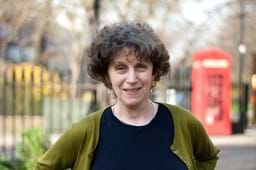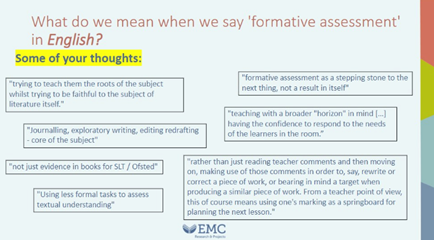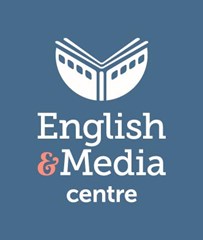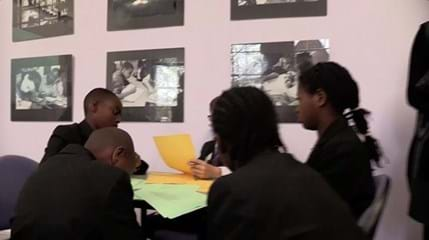There’s been a lot of debate recently about the relative value of group work, pupil talk and teacher transmission of knowledge. On January 24th Nick Gibb made a speech entitled ‘The Evidence in Favour of Teacher-Led Instruction’. It’s worth following the train of his argument, at least in the exposition of his main ideas. First he says that one must have knowledge and, of course, he says, one must be able to apply it. Next he goes on to say that ‘child-centred’ pedagogies ‘focus on eliciting and developing ethereal and often poorly-defined skills in pupils’ and that teacher focus is ‘turned away from ensuring all pupils are taught the core of academic knowledge that they need, and instead teachers attempt to inculcate creativity and problem-solving as if these skills transcend domains of knowledge.’ The two major points in his argument are presented by him as a logical development one from the other. But what if – as is the case for many of us – we believe, like him, that ‘one must have knowledge’ but we disagree with his characterisation of ‘child-centred pedagogies’ as not being interested in knowledge? What if we also disagree with his view that transmission, pure and simple, and only transmission, is the way to develop important knowledge in our pupils?
I’ve been thinking about this a great deal because of the work we’ve been doing at EMC on group work in our project ‘It’s Good to Talk: Developing Group Work in English.’ where I’ve been going into classrooms and seeing English in action. Some of the time I’ve been setting up activities as part of the research; at other times, I’ve watched classes doing the tasks that the teachers have generated for them.
Most recently, I’ve been fortunate enough to be invited to work with Richard Long and his department at St Michael’s in High Wycombe, filming 4 Year 7 mixed ability classes working on poetry, with an emphasis on small group activity. You may note already the care with which I describe this – ‘an emphasis on small group activity’. The way that group work is often characterised by those who don’t see its value is as only group activity. In this caricatured version of it, teachers set up groups, are only interested in nebulous ideas like ‘working together’ or ‘creativity’, privilege above all else students’ interactions for their own sake and ‘skills’ such as ‘collaboration, co-operation’ and so on. The caricature has the teacher almost absent – unwilling to offer information, ideas, knowledge, wisdom or anything else, because ‘it’s only what the children think that counts.’ The caricature has no shaping, no transmission of information or knowledge, no drawing out of key ideas, no pushing students to think more deeply, no questioning of their ideas or building on them with the offer of information and ideas that will take them further.
It would be interesting to know whether those who are so critical of group work are fully aware of the vital role that the teacher must play to make it really effective. Equally, it would be interesting to find out whether they realise that, in really good group work lessons, the time spent in groups is likely to be only a part of the whole lesson. Even in the phase of the lesson that involves group work, it is likely, when it is working at its very best, that the teacher will be constantly weaving between whole class intervention and group talk. This is what I saw in the course of the lessons at St Michael’s.
Let me just give you one or two of the most memorable examples. I constructed a lesson plan (and provided materials) for the Year 7 students. They were to read a small selection of 5-7 poems, selected by me, and choose one individually to share with their group. They were asked to read their poem to each other, explaining why they chose it, and then decide, as a group, on one that they all liked enough to present to the whole class. The aims of the lesson were broad, big picture ones in terms of knowledge – to give students an understanding of how poetry works differently from prose, what pleasures it offers and how one might read complexity and ambiguity with enjoyment, persisting with puzzling elements rather than being intimidated by them. The objectives were not little ones like ‘know what a metaphor is’ or ‘identify sound effects’ but rather much bigger, more significant ones that I believe will stand students in good stead in all their future encounters with poems. In each of the Year 7 lessons on poetry, I asked the teachers to start the lesson by presenting a poem that they particularly liked and talk to the class about it. They were asked to say what they liked about it, what they thought was special about it, any aspects that were complex or puzzling and how they felt about that, with strong guidance that they should indicate to the students that difficulty was something they didn’t fear or shy away from but was a source of great interest and pleasure. (Adult critics and poets, writing for adults on how to read poetry emphasise all of these things). The idea was for the teachers to model their ‘knowledge’ about a single poem and the way in which poems can and should be read. Each of the teachers did this, and the children sat wrapt, listening to their ‘transmission’ of knowledge about poetry. It was so much more than ‘transmission’ though. It was an entry into how to ‘do’ the subject, how to be a serious student of literature but it was also personal, and at times, inspiring. Two teachers chose a Shakespeare sonnet, another a contemporary poem by Andrew Waterhouse, a third Yeats’ ‘Lake Isle of Innisfree’. This latter was a tour de force – a stunning example of a teacher conveying her passionate commitment to a poem, its complex ideas and the way it works. She was the expert guide for students starting out on the same road towards an understanding of the pleasures and complexities of poetry. You can watch this here. In their evaluations, several of the pupils commented on how much they’d enjoyed this, for instance: ‘Poems have changed for me because I was not interested in poetry. Now I am because we wrote about lots of them and sir told me about his favourite poem Sonnet 130, which I really enjoyed.’
After the teacher presentations, the students went into groups. The students chose their own poems and it was notable that they didn’t always opt for the easiest ones but rather ones that intrigued or puzzled them. Poems like ‘A Poison Tree’, ‘The Diameter of the Bomb’ and Emily Dickinson’s ‘I’m Nobody – Who are You?’ were chosen in preference to more straightforward poems of the kind one might expect 11 and 12 year olds to choose. Though the conversations were sometimes hesitant and fumbling, students could be seen grappling for meaning and enjoying the struggle. The student evaluations were extremely positive about the way group work allowed them to make their own choices and work together on difficult texts. One said, ‘Now I find challenging poems more interesting than others.’
In one lesson, following on from this open-ended activity in an earlier lesson, Richard Long introduced a single poem ‘Wind’ by Ted Hughes, using a ‘collapsed poem’ as the starting-point. Groups talked about the collapsed poem and were then given the whole poem to read, in the light of their speculative thinking about the collapsed version. The poem is one that many of us might consider to be very challenging for Year 7. I chose the poem. When we talked about this before the lesson, I suggested that I was less interested in the pupils ‘doing justice’ to the poem itself and more in them learning about how to approach difficult poems with interest, openness and a willingness to work through difficulty towards interpretation.
In the lesson itself, lots of issues were raised about the specific use of the collapsed poem and whether it provided enough support for the students. I’ll explore this question in a later blog, by comparing it with other strategies on the same poem used by the other Year 7 teachers. However, in this blog, my focus is on the question of teacher’s imparting knowledge as groups work on their own. What was fascinating to observe, and then to reflect on again in watching the film footage (view here), was the way in which Richard moved in and out between whole class instruction, questioning and pulling things together, and the group work itself (in which he played a strong role, intervening in individual groups, asking students questions, pausing to share ideas with the intention of highlighting productive ideas and prodding struggling groups in the right direction). He would agree with me, I’m sure, that the extent of that intervention, the timing of it and the nature of it was of critical importance, and we would also agree on the fact that sometimes it’s tricky to know when to challenge an interpretation that is plainly wrong, without undermining students’ confidence. There were times when groups’ ideas went a little astray. Teachers need to challenge, prod, and come clean and be honest about times when interpretations are unconvincing. But when and how? Might my suggested lesson plan have offered more information to the whole class earlier on? Or part way through? These are all aspects of the management of group work that the project is considering, by observation, reflection and shared thinking.
What is absolutely clear is that in all the lessons I saw students were not being left to their own devices, without the teacher contributing knowledge and expertise. Nor was the focus of the teachers on what Nick Gibb describes pejoratively as ‘eliciting and developing ethereal and often poorly-defined skills in pupils’. The focus in the lessons was on knowledge about poetry. Students were being expected to think about poems in the way that adult readers of poetry do, in exactly the way that they’ll need to think about poetry to do well in GCSE unseens, for English Literature A Level and beyond. In other words, they were imbibing serious, significant knowledge in the subject. The idea that group work and teachers imparting knowledge are entirely distinct from each other is hugely simplistic. In the best classrooms teachers weave nimbly between the two, gaining the benefits of both by offering their own understanding and ideas, and allowing students to develop their own.
A big thank you to the English department and students at St Michael's Catholic School, High Wycombe, and to the head teacher, Garret Fay, for inviting us to their school and giving us permission to post this blog.




